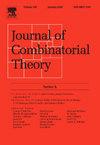Flag transitive geometries with trialities and no dualities coming from Suzuki groups
IF 1.2
2区 数学
Q2 MATHEMATICS
引用次数: 0
Abstract
Recently, Leemans and Stokes constructed an infinite family of incidence geometries admitting trialities but no dualities from the groups (where with p a prime and a positive integer). Unfortunately, these geometries are not flag transitive. In this paper, we work with the Suzuki groups , where with e a positive integer and is divisible by 3. For any odd integer m dividing , or (i.e.: m is the order of some non-involutive element of ), we construct geometries of type that admit trialities but no dualities. We then prove that they are flag transitive when , no matter the value of q. These geometries form the first infinite family of incidence geometries of rank 3 that are flag transitive and have trialities but no dualities. They are constructed using chamber systems and the trialities come from field automorphisms. These same geometries can also be considered as regular hypermaps with automorphism group .
标志传递几何的三角性和没有对偶性来自铃木群
最近,Leemans和Stokes从群PSL(2,q)(其中q=p3n, p为素数,n>;0为正整数)中构造了一个无限族的关联几何,它们只承认试验而不承认对偶。不幸的是,这些几何图形不是标志传递的。本文研究铃木群Sz(q),其中q=22e+1,且e为正整数,且2e+1能被3整除。对于任意奇数m除q−1,q+2q+1或q−2q+1(即m是Sz(q)的某个非对合元素的阶),我们构造了(m,m,m)型几何,它承认三次性但不承认对偶性。然后证明当m=5时,无论q的值是多少,它们都是标志可传递的。这些几何构成了第一个无限的3级关联几何族,它们是标志可传递的,有三角但没有对偶。它们是用腔室系统构造的,特性来自于场自同构。这些相同的几何也可以被认为是具有自同构群Sz(q)的正则超映射。
本文章由计算机程序翻译,如有差异,请以英文原文为准。
求助全文
约1分钟内获得全文
求助全文
来源期刊
CiteScore
2.90
自引率
9.10%
发文量
94
审稿时长
12 months
期刊介绍:
The Journal of Combinatorial Theory publishes original mathematical research concerned with theoretical and physical aspects of the study of finite and discrete structures in all branches of science. Series A is concerned primarily with structures, designs, and applications of combinatorics and is a valuable tool for mathematicians and computer scientists.

 求助内容:
求助内容: 应助结果提醒方式:
应助结果提醒方式:


